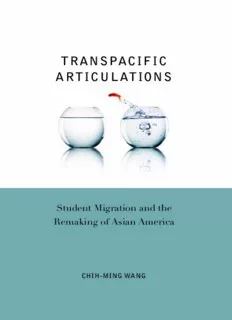
Transpacific Articulations: Student Migration and the Remaking of Asian America PDF
Preview Transpacific Articulations: Student Migration and the Remaking of Asian America
TRANSPACIFIC ARTICULATIONS Student Migration and the Remaking of Asian America CHIH-MING WANG Transpacific Articulations Transpacific Articulations Student Migration and the Remaking of Asian America Chih-ming Wang University of Hawai‘i Press Honolulu © 2013 University of Hawai‘i Press All rights reserved Printed in the United States of America 18 17 16 15 14 13 6 5 4 3 2 1 Library of Congress Cataloging-in-Publication Data Wang, Chih-ming, author. Transpacific articulations : student migration and the remaking of Asian America / Chih-ming Wang. pages cm Includes bibliographical references and index. ISBN 978-0-8248-3642-9 (cloth : alk. paper) 1. Chinese students—Political activity—United States. 2. College students—Political activity—United States. 3. College students’ writings, Chinese—United States. 4. College students’ writings, American. I. Title. LB2376.5.C6W36 2013 371.829'951073—dc23 2012042323 University of Hawai‘i Press books are printed on acid-free paper and meet the guidelines for permanence and durability of the Council on Library Resources. Designed by Integrated Composition Systems, Spokane, WA Printed by Sheridan Books, Inc. Their tears were shed only for the wind. None of them knew that this was just a beginning— that their children would travel the same seas. —Ha Jin, “Departure” Contents Acknowledgments ix Note on Spelling xi Introduction 1 1 ◆ Leaving Asia for America: Yung Wing, Study Abroad, and Translated Subjectivity 21 2 ◆ Writing Diaspora: Tactics of Intervention and Pedagogy of Desire 40 3 ◆ Tracking Baodiao: Diaspora, Sovereignty, and Cold War Imperialism 66 4 ◆ Formosa Betrayed: Transnational Politics and Taiwanese American Identity 90 5 ◆ Internationalism at Work: Bridge and Asian American Studies in Asia 110 Conclusion 134 Notes 143 Bibliography 177 Index 199 Acknowledgments Writing this book has been like traveling through time, reliving the aspirations, frustrations, anxieties, and elations that generations of Asian foreign students experienced before me. Like many of their journeys overseas, mine was luckily guided by a great number of mentors and friends who inspired, encouraged, and supported me through the purgatory of intellectual trial. I could not have come this far without their genuine help. At Santa Cruz, where this book was first conceptualized, I was very fortunate to have worked with many brilliant scholars and teachers who showed me the wonders of intellectual work. Rob Wilson and Chris Connery were my trusted mentors whose genial guidance and generous support put me on the right track to pursue an academic career. Rob introduced me to the enchanting world of postcolonial theory and postmodern poetry, with a jazzy beat of Hawaiian surf and California dreaming, and Chris enlightened me with his charismatic anti- disciplinary stance and taught me how to think creatively and not be daunted by ideas. Together they offered me a model of committed intellectual, engaging teacher, and grounded cosmopolitanism. I thank them wholeheartedly for being the teachers they are. This book is also much indebted to David Palumbo-Liu’s inspirational work, and it was a great pleasure and honor to have him serve on my dissertation committee. I also benefitted greatly from working with Susan Gill- man, Kirsten Gruesz, James Clifford, Karen Tei Yamashita, Neferti Tadiar, Jona- than Beller, Jody Greene, and Gail Hershatter; together they have informed and reformed my thinking and intellectual interests in more ways than one. Beyond the cozy nook of Santa Cruz, Sau-ling Wong, Colleen Lye, and Ling-chi Wang at Berkeley also offered me warm support and kindly took the time to read and com- ment on my work. In Taiwan, Te-hsing Shan, Yu-cheng Lee, Hsiao-hung Chang, Kuan-hsing Chen, and Michael Keevak have mentored me since my college days and showed me their unfailing support. I thank my colleagues at National Tsing- hua University, especially Guy Beauregard (now at National Taiwan University), Iru Su, John Truscott, and Viphavee Vongpumivitch for their comradeship, which made my first year of teaching a great experience. I thank Johanna Katchen, our chair at that time, for reducing my teaching load for one semester so that I could concentrate on the revision of this manuscript. ix
Description: